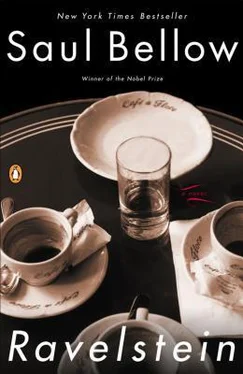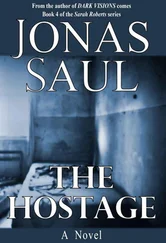"Let's go out then."
"Yes, let's go. _You__ need a meal, Rosamund-you should have a good dinner. I have no appetite, but I'd like you to eat." My nights on this island had been restless-my heart misbehaving. I had increased the doses of quinine prescribed by Dr. Schley, the cardiologist. I swallowed tablets with glasses of quinine water. My head was clear enough but I complained of numbness in the soles of the feet. "Kind of an unpleasant thrill goes through my feet," I said.
"Perhaps it's the way you sit. Try to work standing. Maybe you're overdoing the quinine," said Rosamund.
"Dr. Schley said I could take any amount for the arrhythmia-the fibrillations-Good God! Everybody sounds like a doctor these days."
We walked on the beach to avoid the stink of the chicken and lobster stalls on the main street. At Le Forgeron the patron, lounging outside, pretended to be looking out to sea and didn't return my greeting. "Five thousand miles from France and he's been emancipated from _politesse__," I said.
"We've stopped eating there…."
"_Machts nicht__. He's a pig who was taught manners, but they didn't take. Terrible people everywhere. You can't make a silk purse out of a sow's asshole."
I didn't know how sick I was. All I knew was that I was fitfully irritable or somehow out of whack-a bit deranged. I was aware that I was repeating myself and that Rosamund was distressed. She was wondering what to do. Probably she blamed herself for bringing me here. One of my obsessions is perhaps worth describing. I often said to Rosamund that one of the problems of aging was the speeding up of time. The days flashed by "like subway stations passed by the express train." I often mentioned "The Death of Ivan Ilyich" to illustrate this for Rosamund. Child-days are very long but in old age they fly past "faster than the weaver's shuttle" as Job says.
And Ivan Ilyich also mentions the slow rise of a stone thrown into the air. "When it returns to earth it accelerates at thirty-two feet per second per second." You are controlled by gravitational magnetism and the whole universe is involved in this speeding up of your end. If only we could bring back the full days we knew as kids. But we became too familiar with the data of experience, I suggest. Our way of organizing the data which rush by in gestalt style-that is, in increasingly abstract forms-speeds up experiences into a dangerously topsy-turvy fast-forward comedy. Our need for rapid disposal eliminates the details that bewitch, hold, or delay the children. Art is one rescue from this chaotic acceleration. Meter in poetry, tempo in music, form and color in painting. But we do feel that we are speeding earthward, crashing into our graves. "If these were just words," I said to Rosamund. "But I feel it every day. Powerless thinking itself eats up what is left of life…."
Poor Rosamund, she had to listen to such stuff night after night, at dinner-and this Caribbean holiday was to have been a romantic holiday, something of an additional honeymoon.
"Did you discuss this with Ravelstein?" she said.
"Well… yes, I did."
"What did he say to you?"
"He said that Ivan Ilyich had made a _marriage de convenance__, and that if he and his wife had loved each other things would have looked different."
"The poor things did hate each other," said Rosamund. "Reading that story is like crossing a mountain of broken glass. It's an ordeal." She was very intelligent, Rosamund. We could not only talk to each other but could also count on being understood.
We now turned to the volumes our friend Durkin had asked us to look up, working together on the pages he had asked us to copy out for him. It was a short chore, really, and Rosamund did most of the work. There were no copying machines for volumes of this size. I read the extracts aloud, and Rosamund took them down on her word processor. I had started out with little interest in the material, but I was very quickly absorbed in it. Not the legal side of it, the copyright suit filed by Durkin's client. The author of the journal on which the book was based was an American physician who had spent years in the New Guinea rain forest under a research grant from the National Institute of Something-or-other, and spoke the pidgin or island lingo. That he wrote well made his report all the more effective-super-memorable at times. He described a cliffside covered with great flowers as a "crimson orchid waterfall." There were many near-purple passages, but you felt he was responding to the purple of nature. He had a firm scientific aim and the entire article was important-humanly binding. He started out by describing the shortage of protein in the diet of the tribes he had studied. He said that in the primitive wars, the natives couldn't afford to waste the bodies of their enemies.
Such scientific speculation was not my primary interest. I have several times mentioned that ordinary daily particulars were my specialty. Ravelstein also had several times pointed this out, not the noumena, or "things in themselves"-I left all that kind of thing to the Kants of this world. Black headless bodies in a jungle where crimson orchids stream downward for hundreds of feet _would__ be phenomena, wouldn't they. The men were freshly killed and be headed. The heads were set aside. The researcher who recorded all this said they were a currency used in wife-purchase. That's why headhunters hunt heads. But this American researcher had been attracted to the streamside ambush not by the struggling fighters but by the smell of roasting meat. "Just like a kitchen smell back home-a wholesome joint in the oven. Or a Thanksgiving turkey. Just as appetizing. Human flesh, too, can get you in the salivary glands… the warriors offered me some of their human shish-kebab. The victims were turned on their bellies. The ground was rich in red blood. The victors thought my facial expressions killingly funny. They said, 'Why, it's only meat, like any other meat. '" And indeed the writer went on more than was necessary about the appetizing fragrance. The hunters said that if they had been ambushed the other guys would have been cooking and eating them. With us, this might have been a rationalization. With them it was a fact of life. The jungles do not abound in game. Hunters often are exhausted and in critical need of a meal. The American goes on to speculate about Leningrad in the days when the Nazis besieged it, and to speak also of Japanese soldiers cut off in the Philippine jungles, eating their own dead, and mentions also the South American athletes whose plane crashed in the Andes. And surely our own nihilists who tell you that everything is permitted would have to agree that cannibalism is perfectly logical. "But what made the difficulty for me," writes the U. S. researcher, "was the savory smell of roast human thigh, cut from the corpse that still bled in this paradise of flowers. This was the hard thing for me. Not the heads which the fighters carry when they went a-courting, and swung them by the dusty hair."
Rosamund, now seeing that I really was sick-though I denied it-walked miles through the smoke and fire of curbside grills looking for a Thanksgiving turkey. None was to be found. The skinny local hens seemed to be growing hair, not feathers. At the bottom of a freezer in the market, she found packages of stony drumsticks and wings. She said they looked much worse when they were thawed. On this island of yams and coconuts there were no cooking greens. Nevertheless she managed after hours of effort to produce a chicken soup. Out of gratitude I tried to make a joke of my failure to get it down-remembering an immigrant mother of my childhood who cried out, "My Joey can't eat an ice-cream cone. He turns his head away from it. If he won't lick an ice cream, he's got to be dying! "
Perhaps because I felt the tropics as a death threat my instinct was to look for the comic angle in any question which had to be considered. For one thing I kept thinking that the ground was more porous here. It was not as solid as it was up north. It must be hard to bury somebody in this rotting coral soil. I was not going to take up this crazy topic with Rosamund. Rosamund was blaming herself for having sold me on this delightful holiday-but I knew I could trust her to do the right thing. I was feeling very odd, but I told myself that this was a malaise I had brought from the north-a kind of un easiness or dislocation-something like the metaphysical miseries. Years ago when I had found myself stranded in Puerto Rico for a long stretch I had felt the same kind of noncomfort in the tropical surroundings-smells of trapped brine and decaying marine matter rising from the lagoons-the strange stinks of jungle plant-life and rotting animal matter. The mongoose in Puerto Rico was as common as street dogs elsewhere. You don t think of animals so large living along the roads and the village backstreets.
Читать дальше












